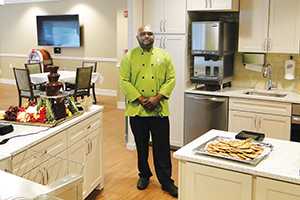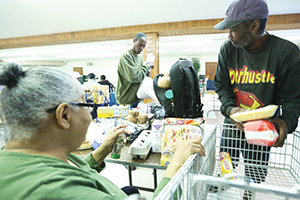By LISA EISENHAUER
The avocado BLT has been a big hit with residents and staff at D'Youville Life & Wellness Community.
Vladimir Mesidor, director of dining services, says the wrap is among the menu options he has developed or refined with the health of residents of the senior living and care community in Lowell, Mass., in mind. The fact that the sandwich — made with traditional BLT ingredients but with the avocado added to provide some extra nutrients — has been popular among workers in the D'Youville cafeteria has been a bonus.

Vladimir Mesidor, director of dining services at D'Youville Life & Wellness Community in Lowell, Mass., says nutrition is always on his mind as he plans the menus. His crew prepares meals for residents, day care patients and staff.
Christy Nary/Courtesy of D'Youville Life & Wellness Community
Mesidor says the nutritional aspects of what goes onto residents' trays is of primary concern to him as the person in charge of D'Youville's food and nutrition operations.
"Healthy eating is what we are looking for, healthy eating, healthy living," Mesidor says. "And we really try our best to make sure the food not only tastes good, but that it actually has all the nutrients they need in it."
Mesidor's belief that healthy food is a key component to healthy living, while perhaps not new, is one that is being increasingly embraced by care providers as a means to reduce health care costs and improve patients' quality of life.
Just this year, the federal government revised its rules to allow some Medicare Advantage plans to offer nutrition benefits such as home meal delivery for beneficiaries. The change had been sought by experts who say nutritious food can be as important as medicine in keeping some people healthy.
"I think people are just realizing that it really makes a difference, if patients are well-nourished when they come to the hospital and if they stay nourished afterward it keeps them out of the hospital," says Julie Trocchio, CHA's senior director of community benefit and continuing care.
Cutting costs, saving lives
A study published this spring by researchers at the Friedman School of Nutrition Science and Policy at Tufts University in Boston supports the idea that providing financial assistance to improve the diets of some Medicare and Medicaid recipients could be life changing for them and cost saving for the nation.
The researchers, with funding from the National Institutes of Health, used statistics from the National Health and Nutrition Examination Surveys and set up a computer simulation to estimate the health and economic impacts of giving people subsidies to pay for healthy food.
The study evaluated two policy scenarios for adults insured by Medicare or Medicaid, and for people eligible for both insurance programs. One was a 30 percent subsidy on the purchase of fruits and vegetables and the other was a 30 percent subsidy on several healthful foods including fruits, vegetables, whole grains, nuts/seeds, seafood, and plant oils.
Among its findings:
- Over a lifetime, the fruits and vegetable incentive would prevent 1.93 million cardiovascular disease events, including 350,000 cardiovascular deaths, and save $40 billion in health care costs.
- Also over a lifetime, the incentive that covers more foods would prevent 3.28 million cardiovascular cases, including 620,000 cardiovascular deaths, and 120,000 diabetes cases and save $100 billion in health care costs.
Yujin Lee, who holds a doctorate in nutritional sciences and is a postdoctoral fellow at Tufts, was one of the lead researchers in the study, which took almost two years to conduct. She says the findings back the idea that food can be a form of medicine.

Lee
"We found that our intervention is as cost effective as the medical intervention, such as the hypertension medication, and other medication and procedures," she says.
While the study didn't use any human subjects, Lee says its results will be tested in a pilot program planned by a Florida-based nonprofit called Living Hungry on a low-income prediabetic and diabetic population.
Though traditional Medicare and Medicaid have yet to provide assistance for healthful food purchases for recipients, Lee sees reason to hope that they might in the future. She points to other ways government is adopting the food as medicine concept, such as the $25 million Produce Prescription Program that was part of the 2018 Farm Bill. That funding will be parceled out as grants to programs that encourage produce consumption through financial, educational or other incentives.
"This kind of funding can provide support for future pilot programs," Lee says. "We are hoping that they can test this model through the pilot programs and see how much the health outcomes can be improved by providing this healthy food."
Nutrition as treatment
Another analysis with similar findings to the one done by the Tufts researchers is cited in a report called "Next Steps in Chronic Care" released in July by the Bipartisan Policy Center, a Washington-based think tank. The analysis was done by Ananya Health Innovations, a firm that provides advisory services in the design and implementation of value-based care models. It looked at the impact providing medically tailored meals could have on hospital readmissions for Medicare recipients who have two or more of 11 chronic conditions, such as congestive heart failure, depression and diabetes.
"Full participation could lead to 575,408 eligible beneficiaries, with 1,012,590 eligible inpatient stays and 9,719 fewer readmissions attributable to the supplemental benefit," the report says.
Overall, the study found that every dollar spent providing the meals could lead to $1.57 in health care savings, including from fewer hospital admissions, emergency room visits and skilled nursing facility stays.
While Medicare and Medicaid don't cover food costs beyond any meals provided during hospital and care center stays, CHA's Trocchio points out that there are other programs that get government funding, such as the Special Supplemental Nutrition Program for Women, Infants and Children, the Supplemental Nutrition Assistance Program and Meals on Wheels, that do provide food assistance and that cover some of the same populations.
She says studies have looked at those programs and found their benefits go beyond just keeping people from being hungry to improving their quality of life and health.
Meals on Wheels has proven itself very cost effective, Trocchio says. "One study called 'More Than A Meal' shows that when you're bringing food to, especially older people, the impact is more than nutrition," she says.
That study — funded by AARP Foundation and done by the Brown University Center for Gerontology and Healthcare Research — found impacts that included fewer falls and less social isolation among the recipients of the program's home-delivered hot meals.
Healthful and locally sourced
While he's not a direct caregiver, Mesidor sees his role as meal overseer as directly connected to the health outcomes of patients and residents at D'Youville Life & Wellness Community.
He takes steps like opting for fresh produce (locally sourced, if possible), modifying favorite recipes to lower the fat and salt content, and trying out new offerings, such as vegetarian chili, to make his menus as healthful as possible for D'Youville's elderly residents.
Mesidor says: "If we're just focusing on the food and we're not focusing on the nutritional value of the food and the healthy eating, we're not really caring for the residents like we're supposed to."
Ascension's Milwaukee pantry equates nutrition and health
At Ascension Ebenezer Health Resource Center in Milwaukee, a food pantry and health education outreach center offering disease prevention and wellness programs, the food-as-medicine concept is in full practice. In fact, clients come in with prescriptions for food.

Jackie Johnson, organizer of the food pantry at the Ascension Health Resource Center in Milwaukee, helps a man pack food to take home. Anyone who needs food can stop by to select from offerings that include lean meats and fresh produce. A registered nurse is on site to offer advice on selections based on the health issues of the person seeking food.
Courtesy of Ascension Wisconsin
The center is located in a predominantly working class, African-American neighborhood — a medically underserved area and food desert without many sources for healthy, fresh food. The center's food pantry is open two afternoons a week to help fill that gap.
The pantry calls itself "diabetic friendly" because, in addition to lean meats and fresh produce, it stocks other foods that are high-nutrient, have low added sugar or no sugar, have low or reduced salt and have high fiber content.
Ascension Wisconsin's Community Services team provides "prescription food cards" to case managers and health care providers at Ascension clinics throughout Milwaukee and those clinicians refer patients to the center for supplemental food and for nutrition education.
The clinicians provide details on the cards about the person's health status. When a client comes in to the center with one of the cards, one of the two community health nurses from Ascension Wisconsin assigned to the center can help steer the individual to food pantry items that could contribute to their best health outcomes.

Buchanan
"We can work out what would be the best food options for them and educate them on that," says Brenda Buchanan, one of the registered nurses.
Buchanan provides practical information related to a patient's diagnosis. For example, she steers people who are battling renal disease away from whole grains because the phosphorous content might be problematic for failing kidneys.
"Food choices are directly related to the disease or have a direct impact on the disease," she says. "So, helping people to understand how to eat better for themselves is huge because they don't know what they don't know."
Buchanan said that while she offers advice, it's up to the people who come to the food pantry to make their food choices.
She gives cooking demonstrations to teach people how to prepare nutritious foods they might not be familiar with, such as squash, and to give them the opportunity to taste dishes to see if they want to add a recipe to their diets.
The center is a collaboration between Ascension Wisconsin, Ebenezer Church of God in Christ and the Hunger Task Force, a Milwaukee nonprofit organization. In addition to the food pantry, it offers education, on chronic disease management assistance with insurance enrollment, instruction on advance care planning and lunch-and-learn sessions on a wide range of health topics. Nurse Julia Means provides diabetic foot care and screening for diabetes and high blood pressure at the resource center.
Buchanan said the food pantry is open to all Milwaukee residents, but its target is the people who live in nearby neighborhoods who either can't afford to buy fresh items, or don't have transportation to get to stores that sell healthy, high quality food.
"It isn't just to take the hunger away," she says of the pantry's offerings. "It's to provide food that's actually nutritious for their body."
— LISA EISENHAUSER